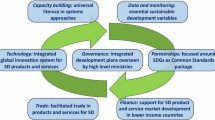Abstract
The relationship between property rights and development has always been a central concern for both theorists and policy makers. The growing role of information and communications technology in the economies of both North and South intensifies the salience of this issue. This commentary extends the discussion of the two visions of property rights that are introduced by Weber and Bussell (2005). In one, property rights are restructured along the lines pioneered by the open-source software community to create a “new commons” of productive tools; in the other, Northern corporations successfully defend their politically protected monopoly rights over intangible assets and even extend them through a “second enclosure movement” to an ever larger set of ideas, information, and images. Currently, the second enclosure movement remains dominant, but which of these visions is likely to predominate in the longer run depends on the interests and potential power of key actors and on the possibilities for alliances among them—not just Northern corporations, but Southern states and private entrepreneurs, as well.
Similar content being viewed by others
References
Acemoglu, Daron, Simon Johnson, and James Robinson. “Institutions as the Fundamental Cause of Long-Run Growth”. Forthcoming in Philippe Aghion and Steve Durlauf, eds.,Handbook of Economic Growth.
Boyle, James, 2003. “The Second Enclosure Movement and the Construction of the Public Domain”. Duke Law School Public Law and Legal Theory Research Paper Series. Research Paper No. 53 (December).
Boas, Taylor, and Thad Dunning. 2005. “Classic Questions, New Context: Development in an Era of Bits and Bytes”.Studies in Comparative International Development 40, No. 2: 3–8.
Cartier, Carolyn, Manuel Castells, and Jack Linchuan Qiu. 2005. “The Information Have-Less: Inequality, Mobility, and Translocal Networks in Chinese Cities”.Studies in Comparative International Development 40, No. 2: 9–34.
Hurst, William. 2004. “Understanding Contentious Collective Action by Chinese Laid-Off Workers: The Importance of Regional Political Economy”.Studies in Comparative International Development 39 (2): 94–120.
Lessig, Lawrence. 2001.The Future of Ideas: The Fate of the Commons in a Connected World. New York: Random House.
Negroponte, Nicholas. 1996.Being Digital. New York: Vintage Books.
Newman, Nathan. 2002.Net Loss: Internet Prophets, Private Profits, and the Costs to Community. University Park, PA: Pennsylvania State University Press.
North, Douglass C. 1994. “Economic Performance Through Time”. Nobel lecture, given on December 19, 1993. Published inAmerican Economic Review 84(3): 359–368.
— 1990.Institutions, Institutional Change and Economic Performance. Cambridge: Cambridge University Press.
— 1981.Structure and Change in Economic History. New York: Norton.
Saxenian, AnnaLee. 2005. “From Brain Drain to Brain Circulation: Transnational Communities and Regional Upgrading in India and China”.Studies in Comparative International Development 40, No. 2: 35–61.
Weber, Steven, and Jennifer Bussell. 2005. “Will Information Technology Reshape the North-South Asymmetry of Power in the Global Political Economy?”Studies in Comparative International Development 40, No. 2: 62–84.
Additional information
Peter Evans is professor of sociology and Marjorie Meyer Eliaser Chair of International Studies at the University of California, Berkeley. His research has focused on the comparative political economy of developing countries, particularly industrialization and the role of the state, as exemplified byEmbedded Autonomy: States and Industrial Transformation (Princeton: Princeton University Press, 1995). He has also worked urban environmental issues, producing the edited volumeLivable Cities: Urban Struggles for Livelihood and Sustainability (University of California Press, 2002). His current interest in the politics of globalization is reflected in his chapter, “Counter-hegemonic Globalization: Transnational Social Movements in the Contemporary Global Political Economy,” forthcoming in theHandbook of Political Sociology (Cambridge University Press).
Rights and permissions
About this article
Cite this article
Evans, P. The New Commons vs. The Second Enclosure Movement: Comments on an Emerging Agenda for Development Research. St Comp Int Dev 40, 85–94 (2005). https://doi.org/10.1007/BF02686295
Issue Date:
DOI: https://doi.org/10.1007/BF02686295




